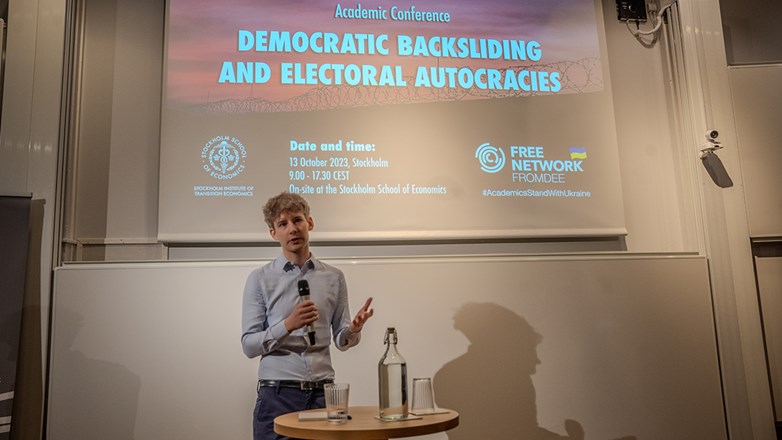Democratic backsliding and electoral autocracies: Research shared at the 2023 Academic conference
The most recent report by the V-Dem Institute concludes that “72 percent of the world’s population […] live in autocracies by 2022” and “the level of democracy enjoyed by the average global citizen in 2022 is down to 1986 levels” (V-Dem Institute, 2023). In Europe, these declines have manifested in the previous Polish government undermining judicial independence, in tightened political repression in Belarus, and most prominently in Putin’s invasion of Ukraine. But the rise of electoral autocracies and democratic backsliding are not confined to Europe – their strategies of propaganda, corruption, electoral manipulation, as well as attacks on judicial and media independence are a global phenomenon. The October 13th FROMDEE Academic Conference gathered researchers from economics, law and political science to bring insight into why and where reversals are taking place, and what measures are needed to reverse the negative trend. This policy brief provides an overview of the research shared at the conference.
Populism and autocracy – the case of Russia
In the keynote lecture, Arturas Rozenas (New York University) focused on the roots of populism, challenging the common view of illiberal democracies as a mix between democracies and dictatorships. Rather, dictatorships evolve into populist dictatorships that then take one of two paths: either the path to democracy, or the path towards electoral autocracy, illiberal democracy, or totalitarianism. In this framework, populist dictatorships have historically made use of populist elements we recognize from modern times, i.e., democratic-seeming institutions misused for the ruler’s purposes.
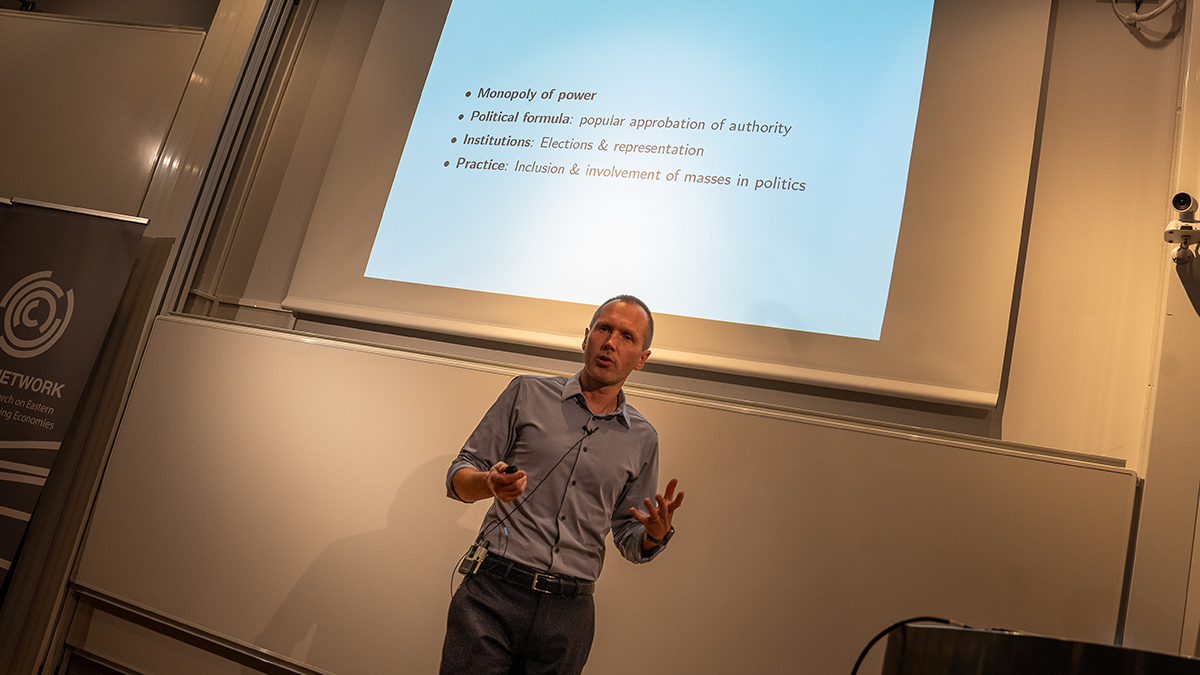
Photo of Arturas Rozenas, New York University. Photo: Dominick Nilsson
In a populist dictatorship, Rozenas continued, there is a monopoly of power. Institutions such as elections and parliamentary representation, serve not to allocate power but to legitimise it. The transition from passive to active dictatorships coincided with a move away from the common notion of a king or similar leader deriving rightful power from God to rule the masses, to a reality built on the idea that the ruler’s legitimacy stems from the masses. This historic transformation should however not be interpreted as a transition to democracy. In fact, Rozenas showed that for most of recent history, the majority of elections and expansions of suffrage took place in dictatorships rather than in democracies. These seemingly populist institutions serve not only to legitimise governments, but also to coopt the population in a public display of the ruler’s strength. Rozenas argued, that in an active populist dictatorship, the ruler creates a setting which suppresses dissent and expectations of dissent, through institutionalised expressions of support (in the form of political participation, elections, large rallies etc.).
Turning to the Russian setting, the first thing to notice is the deep tradition of autocracy – from tsarism to Stalinism. In Russia, the words “society” and “the people” briefly blossomed during past revolutions or uprisings but have largely been absent in the Russian language and are once again on the decline under the rule of Putin. Further, the Russian population has time and again been exploited by its rulers during succession crises for displays of power and dominance. Examples of this are the mandatory elections held under Stalin two weeks after the invasion of the Baltic States in 1939 and more recently under Putin in the occupied territories of Luhansk and Donetsk in Ukraine in 2021. Such populist autocratic strategies are nothing new in Russia, concluded Rozenas – rather they derive from the internal logic of dictatorship that has played out throughout Russian history.
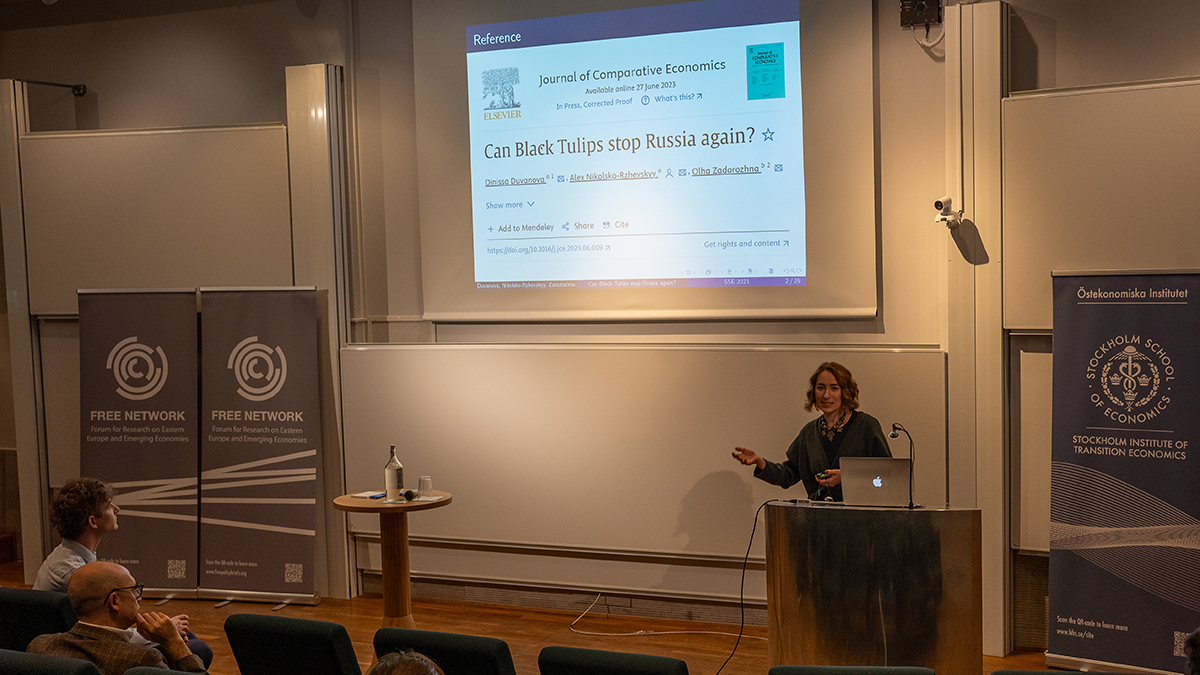 Olha Zadorozhna, Kozminski University. Photo: Dominick Nilsson
Olha Zadorozhna, Kozminski University. Photo: Dominick Nilsson
Continuing the notion of the “absent” Russian society, Olha Zadorozhna (Kozminski University) began her presentation by explaining that protests are infrequent in Russia and have surprisingly few attendees given the country’s large population. While there were mass protests in the run-up to the collapse of communism in the 1980’s and protests took place against corruption in 2017-2018, and in relation to the arrest of Alexey Navalny in 2021, protests in Russia are typically not motivated by an overarching ideology or broader political questions. Rallies in favor of authoritarianism and ethno-nationalism are a more common occurrence. Moreover, there are few indications that the invasion of Ukraine, sanctions and subsequent economic downturn have negatively affected the Russian population’s support for the regime. Still, literature has shown that war-related deaths can mobilize opposition against war participation (e.g., the U.S. participation in the Vietnam War). Considering this, Zadorozhna evaluates whether the deaths of Russian soldiers provoke a reaction among the Russian population. By combining social media data on fallen soldiers with protest activity for the first four months of the Russian invasion in 2022, the study find that casualties lead to an increase in protest activity, indicating that deaths can in fact mobilize public opposition in Russia.
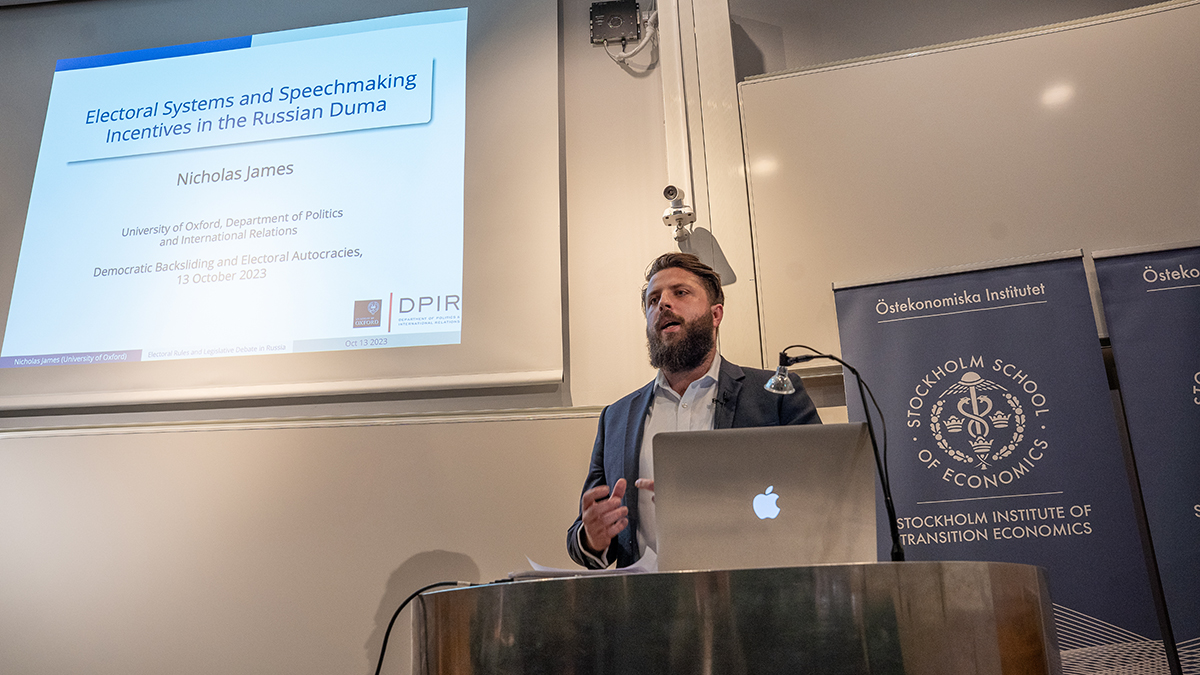
Nicholas James, University of Oxford. Photo: Dominick Nilsson
Other populist strategies to ensure support for Putin in Russia relate to political participation and the judiciary. Nicholas James (University of Oxford) analysed electoral rule changes in the Russian Duma – from mixed member majoritarianism to proportional representation (PR) – by measuring their effect on floor participation. Applying a difference-in-differences framework, James found that deputies experiencing a change from PR included less words in their speeches following the switch (about 15-20 percent of an average speech). This effect should be understood in the political context of the ruling party’s (United Russia) increased influence during this time period (2010s). In fact, James concluded, the results point in the direction of the regime tampering with the Duma in an impromptu and reactionary manner with the overall goal of obtaining closer control and the appearance of support for the regime.
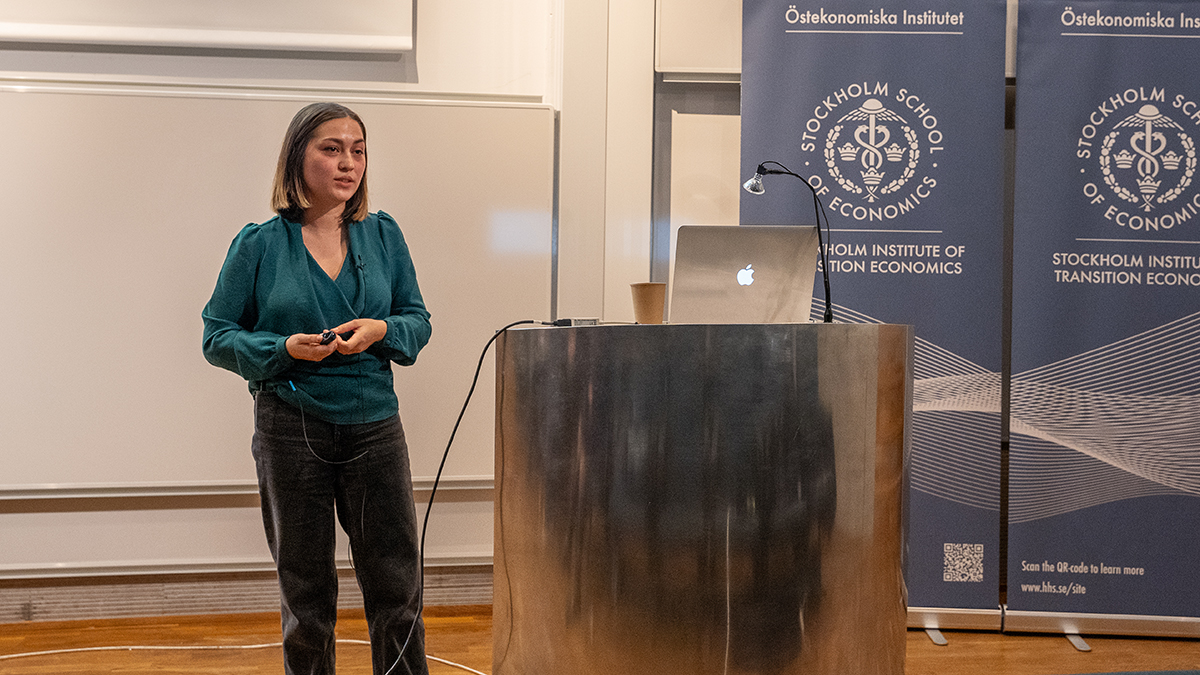 Yulia Khalikova, University of Hamburg. Photo: Dominick Nilsson
Yulia Khalikova, University of Hamburg. Photo: Dominick Nilsson
Yulia Khalikova’s (University of Hamburg) presentation gave further insight into how ostensibly democratic institutions can be exploited to make an authoritarian regime appear legitimate. In her work, Khalikova considers judicial references to international law that may be employed strategically, without necessarily adhering to the spirit or content of the law. Looking specifically at international law citations in 601 judgements made in the Russian Constitutional Court (RCC) between 2000 and 2021, Khalikova find evidence that the RCC has increasingly cited international courts when making judgements on topics related to politics and physical rights, indicating that state policy influences citation patterns. The change in citation patterns also points to the RCC currently using international law to support the regime and uphold its legitimacy, meaning that international law – adopted with the ambition of enhancing democratic values and ensuring human rights – is misused for undemocratic and repressive purposes.
Censorship and propaganda
Information control is an important feature of autocratic regimes. Philine Widmer (ETH Zurich) considers the Chinese setting – where the regime controls the amount of foreign information available on the internet via a countrywide firewall. Research has shown that autocracies make use of censorship strategies to control their citizens, but these are associated with high reputational costs and can be overcome by tech-savvy citizens. Using a machine learning algorithm, Widmer first predicts a newspaper article’s alignment with the Chinese regime before comparing the placement of more/less aligned articles on news websites. Her results show that front-page news stories in Chinese newspapers are more aligned with the regime’s stance than other content. Front-page placement in turn matters for information uptake. Widmer ended the presentation by comparing the additional cost of finding less aligned articles to the technological costs required to access outside media (e.g. VPNs). For an autocracy to achieve its information control objectives, independent news may just need to be relatively harder to access. It does not need to make it impossible to access for all citizens.
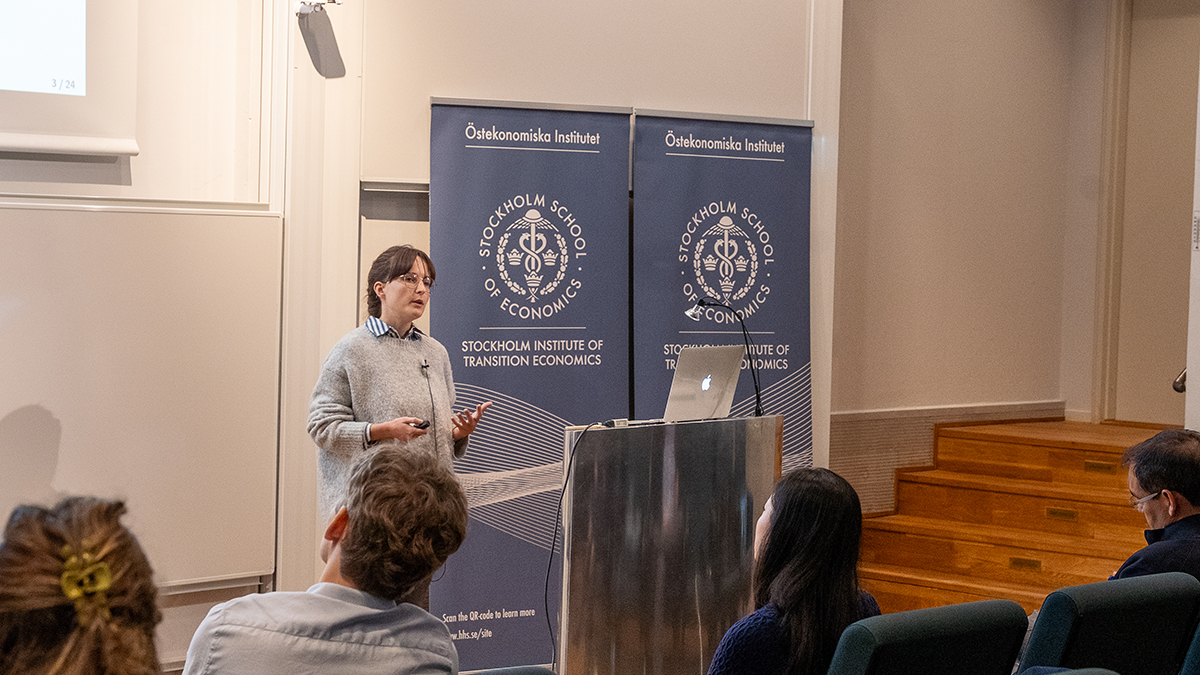 Philine Widmer, ETH Zurich. Photo: Dominick Nilsson
Philine Widmer, ETH Zurich. Photo: Dominick Nilsson
Censorship is typically accompanied by, and complementary with, propaganda. Restricting other narratives allows autocratic regimes to spread their own. While propaganda is a common feature within autocracies, Jaakko Meriläinen’s (Stockholm School of Economics) presentation evaluated the effect of autocratic propaganda in a democratic setting.
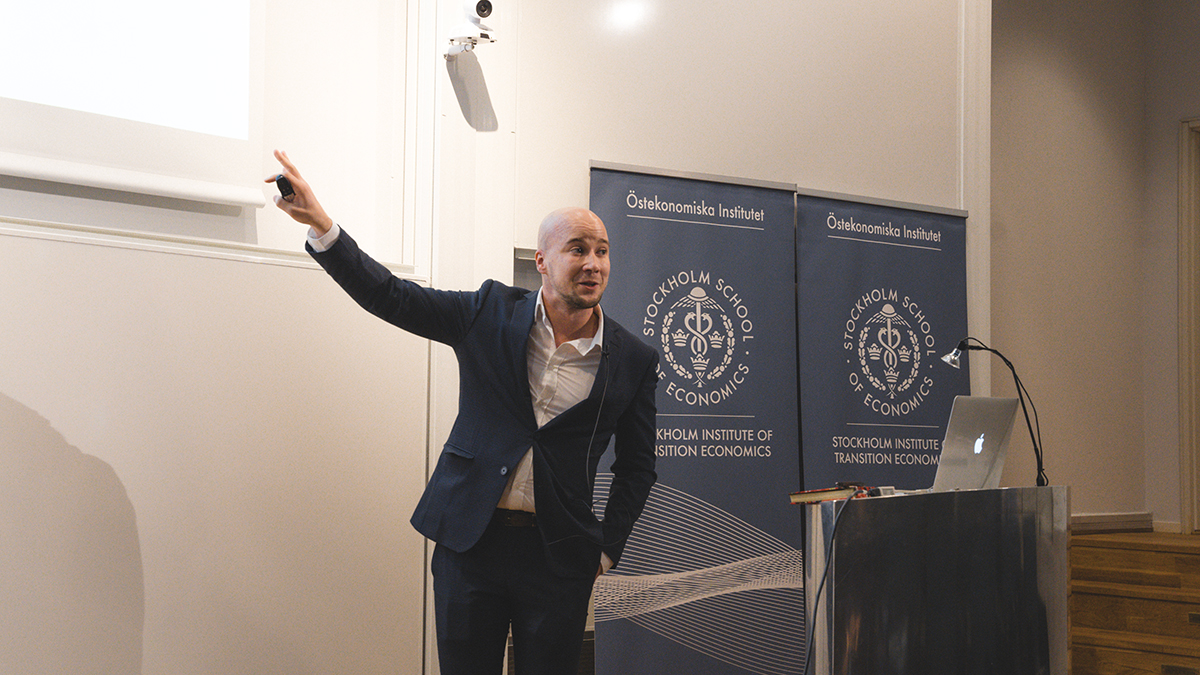
Jaakko Meriläinen, Stockholm School of Economics. Photo: Dominick Nilsson
Meriläinen’s study focuses on a rogue experiment in which some Finnish children in the 1970’s were taught history and social sciences using material from the Soviet Union – material which was in essence Soviet propaganda. By exploiting geographical and cohort variation, Meriläinen use a difference-in-differences approach to compare the 213 exposed children to children taught the regular Finnish curriculum. The long-term outcomes show that exposed children had lower incomes in adulthood, worked fewer months per year and were engaged in more left-leaning and publicly beneficial occupations (such as, nurses and firefighters).
Information and accountability
The use of technological innovations to access otherwise restricted information was central to Arieda Muço’s (Central European University) presentation. She studies the spread of the Xerox photocopying machine in communist Hungary in the 1980’s – a setting characterised by limited freedom of speech and restrictions on the media. She reported that areas with early placement of Xerox machines are found to exhibit higher shares of pro-democratic voting. Muço ascribes these outcomes to the fact that the machines allowed for the spread of information and eased coordination of the opposition, suggesting that new technologies and information can act as key facilitators in the fall of autocratic regimes.
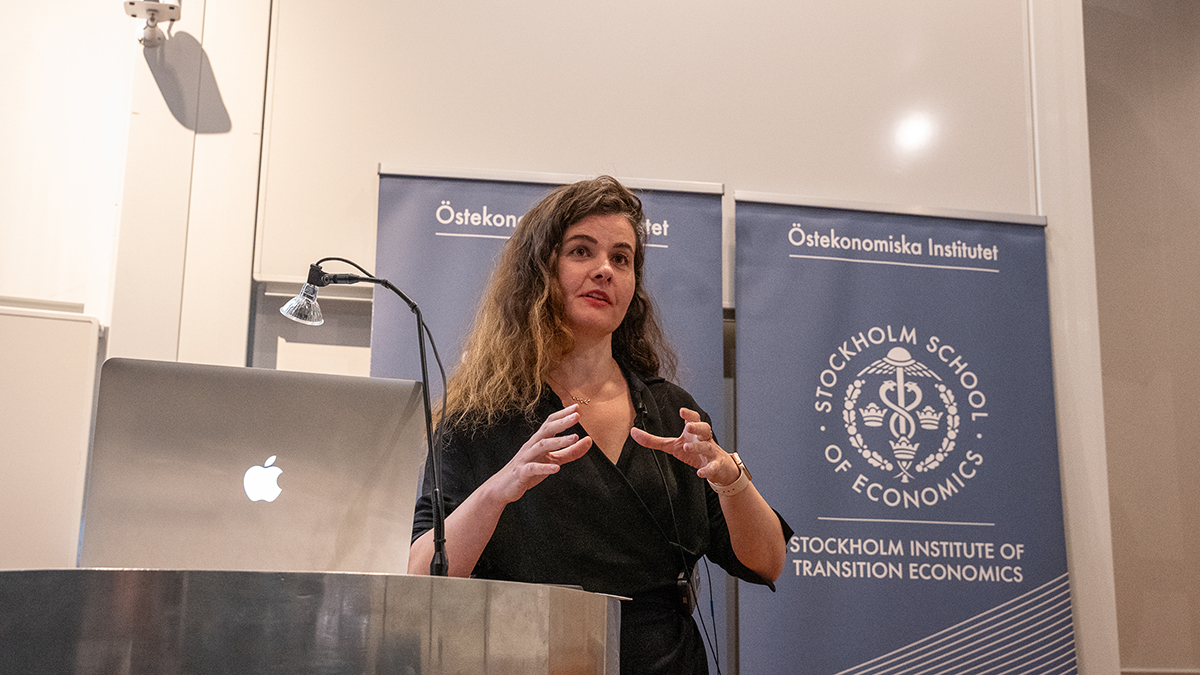 Arieda Muço, Central European University. Photo: Dominick Nilsson
Arieda Muço, Central European University. Photo: Dominick Nilsson
Providing citizens with information was also a key feature in Enrique Seira Bejarano’s (Michigan State University) presentation. He began by discussing two potentially related trends: in Latin America recent years have seen (i) increased levels of corruption and (ii) increased dissatisfaction with democracy among citizens. The number of corruption-related news articles have increased threefold in Spanish and doubled in English and the share of people perceiving corruption to be the greatest challenge to their country has doubled in the last decade. The study uses two empirical strategies to identify the effect of corruption on democratic values.
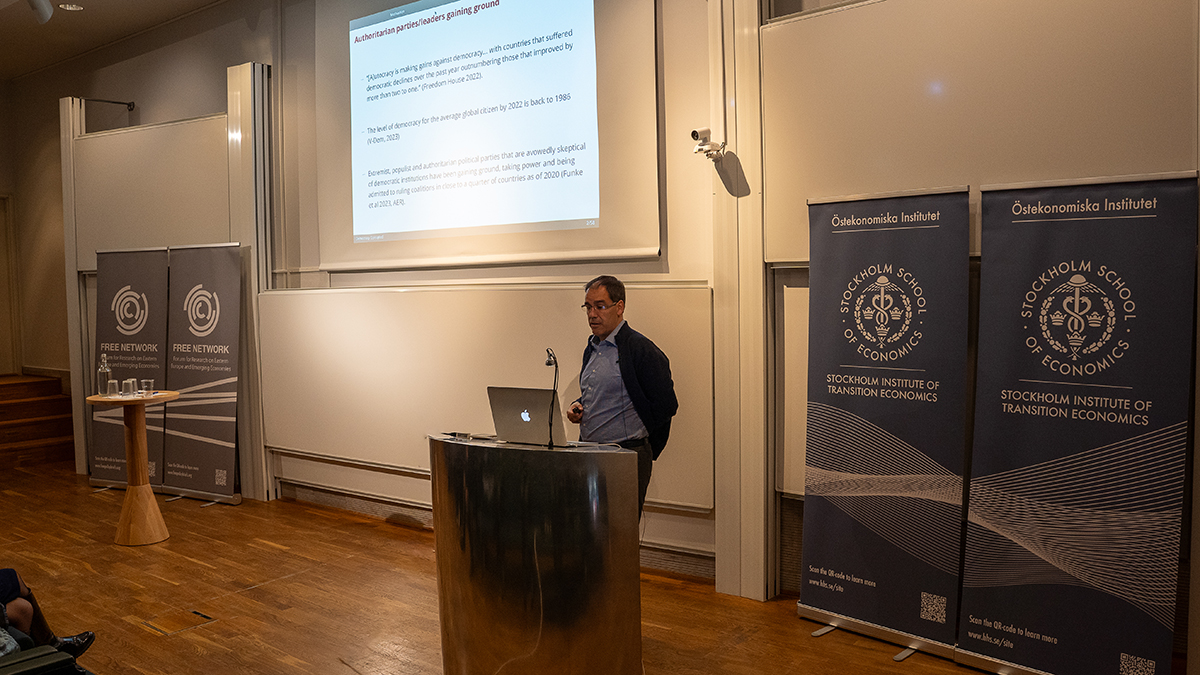 Enrique Seira Bejarano, Michigan State University. Photo: Dominick Nilsson
Enrique Seira Bejarano, Michigan State University. Photo: Dominick Nilsson
Firstly, Seira Bejarano described an observational study, in which data on major corruption scandals were combined with Latinobarometer data on support for democracy. The authors find that corruption scandals increase corruption perceptions while decreasing stated support for democracy. Secondly, Seira Bejarano reported the results of a randomized controlled trial in which some respondents were shown videos of a politician accepting bribes. This had a negative effect on preferences for democracy and on trust more broadly. Both studies show that revelations of corruptions decrease the support for democracy, suggesting a potential tradeoff between the public’s belief in democratic institutions and increased transparency which is important for accountability but can also expose corruption.
Right-wing populism
Yet another threat to democracy is the rise of right-wing populism – currently a reality in many well-established democracies across Europe. In Germany, the far-right party Alternative für Deutschland (AfD) enjoys around 21 percent of voters’ support according to recent polls. To understand their rise in popularity, Navid Sabet (Goethe University Frankfurt) builds on previous literature on cultural conflict as a driver for right-wing party support.
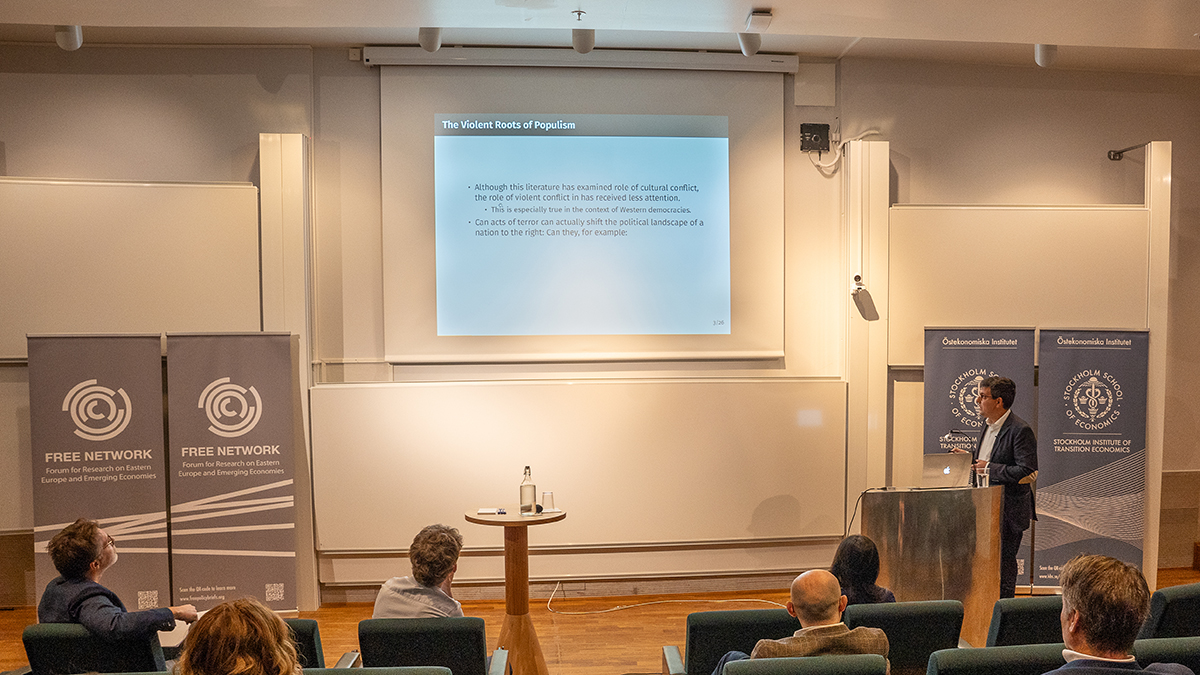 Navid Sabet, Goethe University Frankfurt. Photo: Dominick Nilsson
Navid Sabet, Goethe University Frankfurt. Photo: Dominick Nilsson
The paper he presented examines the role of violent conflict in the form of terrorist acts. It evaluates whether acts of terror can alter the political landscape and shift support to the far-right. To avoid selection problems, the authors compare successful terror attacks to attacks that failed. Sabet reported that successful small-scale attacks (predominantly targeting migrants) increase AfD’s vote share by about 6 percentage points in state elections (in the time period 2013-2021). The acts of terror were found to increase voter turnout, by mobilizing otherwise idle voters, but also by gaining votes at the cost of other parties. Exploring the mechanisms behind these results, the authors study the language used by political parties and the way successful attacks were covered in the media. Relative to coverage of unsuccessful attacks, media coverage used a more negative tone, more words related to Islam and terror and fewer words related to right-wing populism. This suggests that media plays an important role in shaping the public’s response to acts of terror and that far right parties are able to exploit this dynamic.
Concluding remarks
The 2023 FROMDEE Academic Conference brought together academics from different fields to shed light on some of the main challenges to democracy today. In part, the research presented supported the prevailing narrative that democracies are backsliding in many parts of the world. However, by analysing how autocracies and populist leaders operate, the presenters also highlighted the vulnerability of dictatorships.
Arturas Rozenas cited the example of a rally in Bucharest in 1989, which was organised to display support for Ceauşescu’s regime and descended into an anti-government protest. Dictatorships can benefit by coopting the populist elements of democracy but, in doing so, they risk creating a vehicle for genuine democratic expression.
The audience learned about autocracies’ efforts to control the flow of information but also about citizens’ ability to circumvent restrictions whether in 1980s Hungary or present-day China. Several presentations focused on the extent of autocratic control in Russia but even in this setting, the death of soldiers in Ukraine motivates citizens to participate in protests.
Recent trends suggest that democratic institutions should not be taken for granted in any country. Societies can become more resilient to the threat of democratic backsliding, in part by better understanding how both democracies and autocracies operate and what makes them vulnerable. Researchers around the world are using innovative methods to expand our knowledge in this area, as reflected in the presentations at the 2023 FROMDEE Academic Conference.
References
Disclaimer: Opinions expressed in events, policy briefs, working papers and other publications are those of the authors and/or speakers; they do not necessarily reflect those of SITE, the FREE Network and its research institutes.
Cover photo: Jonathan Lehne, Assistant Professor, SITE. Photo: Dominick Nilsson
